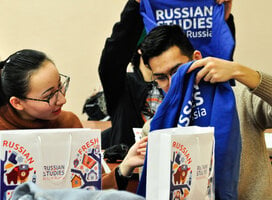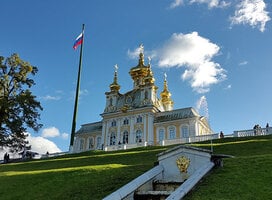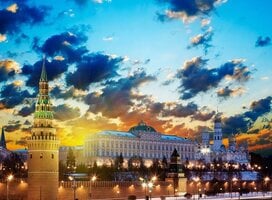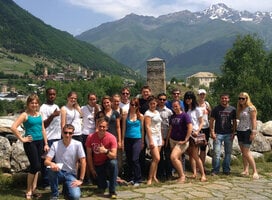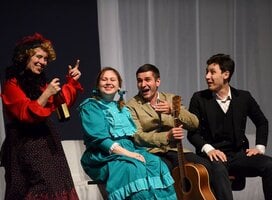Russian Language Schools Abroad
Vast and mysterious, the Russian language seems as foreign and distant to the Western world as, well, Siberia. With almost 150 million speakers, Russian is the one of the ten most spoken languages in the world. So why all the mystery? In the 20 years since the Iron Curtain fell, language learners are starting to see what all the fuss is about. So whether you love a good cat circus, pierogi, or whatever this is, come learn Russian abroad!
There are a ton of Russian language schools, universities and private teachers who can help you make your language dreams into realities. Each type of program comes with advantages and disadvantages, so let us break it down for you:
Program Types
- University Courses: University courses a wonderful both for current college students or those who prefer a structured environment. Anyone who wants to receive “credit” for their language learning (whether you’re learning Russian for school or as professional enrichment) should enroll at a university where there will be clear records of your language-learning accomplishments.
- Private Classes: If you have the cash and are feeling extra committed, consider taking private classes. While the unwavering focus of a Russian teacher can be intimidating to many, private classes give you the flexibility to focus on exactly what you need to improve and let you set your own schedule. If you want all the advantages of one-on-one teaching, but don’t want to sign up for a whole course of study, think about combining other types of classes with a few sessions of a private tutor a week.
- Group Courses: Group courses are generally a better bargain than either private or university classes. With a small group of other students, you "share" the teacher and also get the benefit of interacting with other people. You learn from other student’s attempts, mistakes and successes, reinforcing your progress.
Cultural Immersion/Extracurricular Activities
To give yourself a leg up, immerse yourself into the local life through homestays, cultural activities, internships, and volunteering. Many programs offer classes in the morning and give you the afternoon to explore your personal interests. Use this time wisely, because as you participate in the day-to-day reality of Russian speakers, you’ll not only get to practice your Russian skills, you learn loads about the regional slang, cultural traditions and more. Homestays will give you the opportunity to be welcomed by a Russian family; internships will give you practical career experience and build your resume; volunteering will give you a chance to give back; and cultural activities will get you out and about doing something fun like eating, dancing or whatever your heart desires!
Why Learn Russian Abroad?
The Russian language is full of history, humor and traditions. As the language of Pushkin, Euler, Chagall and Rachmaninoff (to name just a few) Russian has so much to offer. Will you take up the challenge?
Highlights
Say Hello Like the Locals: Что нового? (shtoh NOH-vah-vah) >> What's up?
Fancy a Joke?
Выкуренная сигарета сокращает жизнь на 2 часа, выпитая бутылка водки - на 3. Рабочий день сокращает жизнь на 8 часов.
“One cigarette reduces your life by 2 hours, one bottle of vodka - 3 hours. Your work day reduces your life by 8 hours.”
Wow others with an Idiom!
Вешать лапшу на уши means “To hang noodles on one's ears” or to talk nonsense
Did you know...? Russian nouns have animacy, which means that ‘animate’ words are considered more alive than ‘inanimate’ words. So a dead man (мертвец) in Russia is more alive than a corpse (труп). Why? Because a dead man is animate and a corpse isn’t!
Cities
Russian is the official language in Russia (duh) but is also regularly spoken in Ukraine, Belarus, Kazakhstan and Kyrgyzstan—not to mention a ton of former USSR countries like Latvia, Lithuania, Estonia, and Moldova. Speak a little ру́сский язы́к (Russian) and you’ll be understood pretty much anywhere in Eastern Europe. When you choose your destination to learn Russian abroad, pick a place that fits your budget and that gets you excited to study hard!
- Russia: Russia, as the birthplace of the Russian language is your obvious choice. The country is gigantic (seriously, it’s huge- Russia is 1.8 times larger than the US) so there are plenty of options when choosing a region. You can stick with big cites such as baroque St. Petersburg or traditional Moscow or even explore the vast and gorgeous Russian countryside in Siberia (in the summer, of course).
- Ukraine: The word ‘Ukraine’ means ‘land on the edge,’ and it certainly seems far removed from most traveler’s minds. However, its relative obscurity as a tourist destination makes it an ideal destination for language learners who are hoping to get of the beaten path, immerse themselves in the language and save some money in the process. The capital, Kiev, is home to many excellent schools.
- Lativia: Lativia is an intriguing mix of tiny villages frozen in time and hip nightclubs with thudding base. While it may not have the cosmopolitan appeal of Russia, the capital Riga and the surrounding country will always offer something interesting.
Choosing a Russian Language Program
Getting abroad can be complicated. Most Eastern European countries have strict visa regulations. Many programs require applications to get started. You have concerns about budgets and even fears about the difficulty of the Russian language.
Qualifications
Russia has a complicated visa system that should be tackled ASAP—typically, getting your visa can take a month or more. To obtain a visa, you first need an invitation, usually provided by your program, hotel or by a travel agency. Invitations can be free or cost a small fee (typically between €20 to €40). Once you have your invite, you can get a tourist visa is valid for a maximum of 30 days from the date of entry, or a student visa that will cover your long-stay study program (note that for a student visa, you’ll have to produce evidence of an HIV test).
Level of Difficulty
No one will tell you that learning Russian will be easy. (If they do, yell “LIAR, LIAR, PANTS ON FIRE” and walk away, cause you don’t need friends who lie. Go get better friends and share some borscht and vodka. #protip)
The biggest hurdle for Russian language learners is the Cyrillic alphabet. Tantalizingly close to the Roman alphabet, but definitely different, many students feel duped by the ‘R’ masquerading as a ‘P’ and the ‘В’ pronounced like a ‘V”. You’ll get used to it quickly, but avoid “translating” in your head—better to learn as fast as possible.
Once you’ve covered the basics, you can start probing a bit deeper. Although the grammar and vocab can be overwhelming, students will encounter a surprising number of cognates between English and Russian, due to the traditional crossover between French and Russian, and modern English media. This’ll make it easy to pick up the language a little quicker!
Russia is a pricey destination (Moscow and St Petersburg are consider two of the most expensive cities in the world). Although it’s not impossible to stick to a budget, if you’re looking to save some cash consider a more unusual destination like Lativia, Maldova or another small country. Although getting to these places might be more expensive, you may end up saving money in the long run. Weigh your options and choose the destination that fits your financial needs.
Scholarships
- The Travelocity Travel for Good award provides tons of funds for those who volunteer during their next vacation.
- The Delaying the World travel grant offers thousands of dollars to 21-29 year olds who want to do more worldwide exploring before they settle down.

